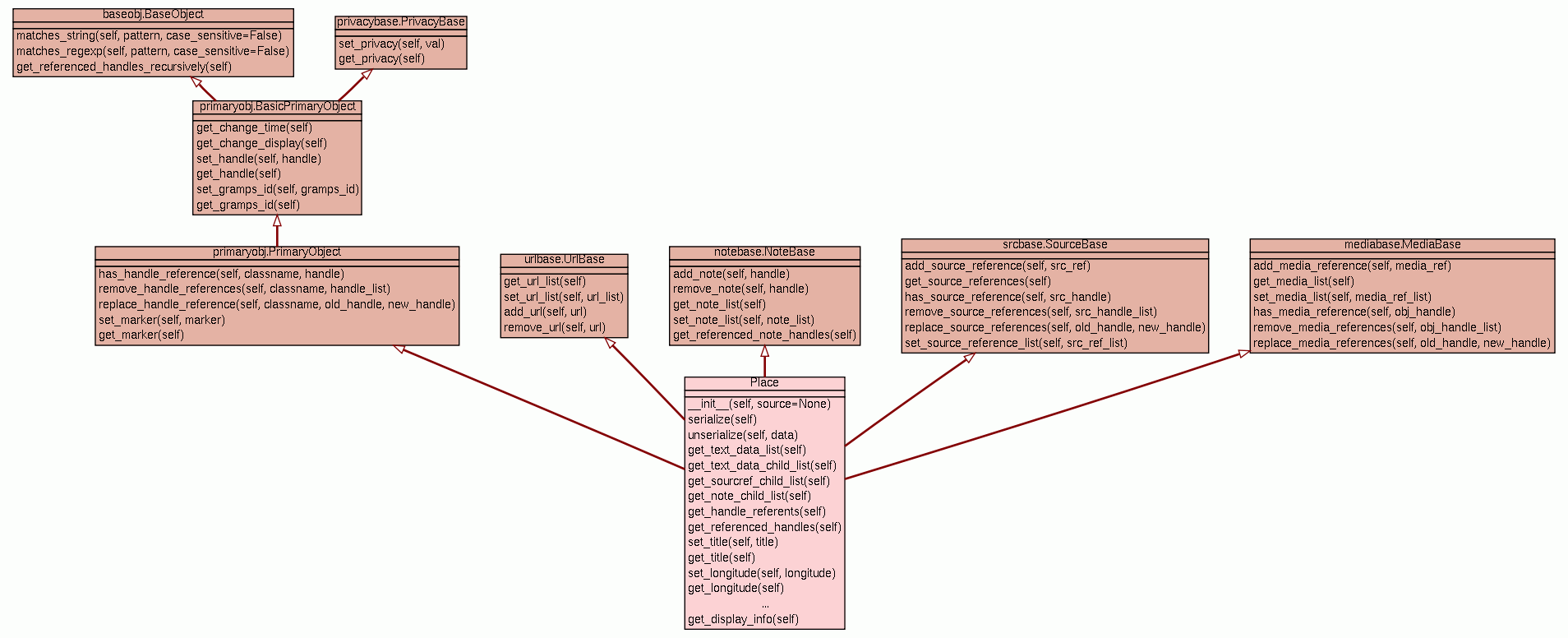
| Trees | Indices | Help |
|
|---|
|
|

Contains information related to a place, including multiple address information (since place names can change with time), longitude, latitude, a collection of images and URLs, a note and a source.
| Instance Methods | |||
|
|||
| tuple |
|
||
|
|||
| list |
|
||
| list |
|
||
| list |
|
||
| list |
|
||
| list |
|
||
| list |
|
||
|
|||
| str |
|
||
|
|||
| str |
|
||
|
|||
| str |
|
||
| Location |
|
||
|
|||
| list of Location objects |
|
||
|
|||
|
|||
|
|||
|
Inherited from Inherited from Inherited from Inherited from Inherited from Inherited from Inherited from Inherited from |
|||
| Method Details |
Create a new Place object, copying from the source if present.
|
Convert the data held in the Place to a Python tuple that represents all the data elements. This method is used to convert the object into a form that can easily be saved to a database. These elements may be primative Python types (string, integers), complex Python types (lists or tuples, or Python objects. If the target database cannot handle complex types (such as objectes or lists), the database is responsible for converting the data into a form that it can use.
|
Convert the data held in a tuple created by the serialize method back into the data in a Place object.
|
Return the list of all textual attributes of the object.
|
Return the list of child objects that may carry textual data.
|
Return the list of child secondary objects that may refer sources.
|
Return the list of child secondary objects that may refer notes.
|
Return the list of child objects which may, directly or through their children, reference primary objects.
|
Return the list of (classname, handle) tuples for all directly referenced primary objects.
|
Set the descriptive title of the Place object.
|
Return the descriptive title of the Place object.
|
Set the longitude of the Place object.
|
Return the longitude of the Place object.
|
Set the latitude of the Place object.
|
Return the latitude of the Place object.
|
Return the Location object representing the primary information for the Place instance. If a Location hasn't been assigned yet, an empty one is created. |
Assign the main location information about the Place to the Location object passed. |
Return a list of alternate Location objects the present alternate information about the current Place. A Place can have more than one Location, since names and jurisdictions can change over time for the same place. |
Replace the current alternate Location object list with the new one. |
Add a Location object to the alternate location list. |
Get the display information associated with the object. This includes the information that is used for display and for sorting. Returns a list consisting of 13 strings. These are: Place Title, Place ID, Main Location Parish, Main Location County, Main Location City, Main Location State/Province, Main Location Country, upper case Place Title, upper case Parish, upper case city, upper case county, upper case state, upper case country. |
| Trees | Indices | Help |
|
|---|
| Generated by Epydoc 3.0.1 on Sun Mar 9 21:52:41 2008 | http://epydoc.sourceforge.net |